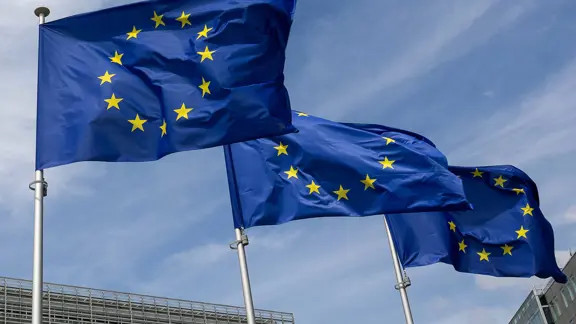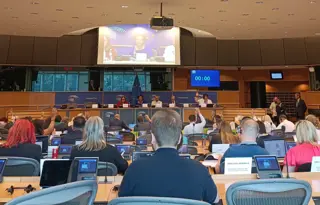News
FIFPRO Europe Statement: European Parliament’s Education & Culture Committee vote on European Sport Model report

- The vote marks an important step towards protecting Europe’s leading cultural and entertainment sector, with key proposals to strengthen its social and governance foundations
- It illustrates clear support for EU rule of law, the role of the European Commission, and the application of social rights and social partner involvement in decision-making
- The report provides a necessary counterweight to FIFA’s continued unilateral decision-making, which threatens workers’ rights and social dialogue both in Europe and around the world
FIFPRO Europe welcomes the successful vote by the European Parliament's Education & Culture Committee on the own-initiative report "Role of EU Policies in Shaping the European Sport Model" by rapporteur Bogdan Zdrojewski.
The report was endorsed by an overwhelming majority of the elected Members in the Committee and represents a significant call to action to safeguard a competitive European cultural industry by investing in social partners and collective governance.
The initial vote on the report in the Committee comes at a critical time of the sector in Europe and around the world.
Rule of law, social rights, and worker involvement
FIFPRO Europe particularly welcomes the strong provisions on the EU rule of law, the critical role of the European Commission, the application of social rights in the field of sport and the role of occupational health and safety based on a robust involvement of elected workers' representatives.
The members of the European Parliament clearly stress that fair and healthy competition in the football industry and its wider economy demands the respect for our social market economy and social partner rights.
The report's recognition that athletes often face insufficient social protection, rising intensity of their sports and match calendars, as well as challenges with combining education and employment with their sport careers fully aligns with our six priorities in FIFPRO Europe’s position paper entitled: A Competitive European Football Industry – EU Institutional Term 2024 - 2029.
Advancing sustainable work, the respect for contracts and fundamental rights at work remain a core priority for the football industry in Europe and around the world as sub-standard working conditions remain a reality for far too many players.

The threat of unilateral governance for the European Model of Sport
These provisions are ever more important in the context of FIFA’s unilateral governance behaviour in its role as a governing body, which undermines workers' and social partner rights specifically but not exclusively on health and safety and collective bargaining. While the path forward requires continued dialogue between all stakeholders, it is critical for a competitive European sports industry to protect its value from unilateral actors at international level.
The report's emphasis on proactive risk management in developing and overseeing Occupational Safety and Health policies, including factors such as travel, match calendars and overlapping competitions is particularly timely as FIFA continues to act in isolation without any involvement of the elected social partners at national level, in Europe and around the world.
Specific priorities to advance social partner rights
We commend the Committee's recognition of several athlete-specific priorities that FIFPRO Europe and social partners have long championed:
- Fundamental Rights Protection: The call for EU institutions to protect and promote fundamental rights of athletes and other workers in the sport sector, including social rights and protection, collective bargaining rights, and decent working conditions.
- Court of Justice Case Law: The emphasis on ensuring that all institutions, sports governing bodies and stakeholders abide by the principles set out in the case law of the Court of Justice of the European Union in the field of sport.
- Commission as Guardian of Treaties: The call for the Commission to fulfil its role as guardian of the treaties in monitoring and addressing threats to the European Sport Model, including breakaway competitions that endanger the overall sport ecosystem.
- Protecting European Value: The encouragement for the Commission to use all appropriate tools to protect the European sport sector from initiatives aimed at undermining it and transferring the value that it creates outside Europe.
- Governance Accountability: The recognition that sport's autonomy is conditional upon good governance, with calls for the highest standards of governance, integrity and transparency with appropriate checks and balances to ensure accountability in international sport governance.
- Calendar Coordination: The acknowledgment that sport calendar has become more intense due to the increase of continental and international matches and competitions and the call for involvement of all stakeholders in calendar decision-making processes.
- Transfer System Reform: The emphasis on ensuring a transparent and fair transfer system in line with EU law and European specificities.
The report's strong foundation on the principle of solidarity and its call for strengthening connections between professional and grassroots sport, as well as effective financial solidarity mechanisms, demonstrates a comprehensive understanding of the European Sport Model's values.
A call to action to strengthen a sustainable European industry
As we move toward the plenary vote following the summer recess, FIFPRO Europe remains committed to working with all stakeholders and partners to ensure that the final report maintains its strong focus on existing EU policies that have the ability to shape the European Model of Sport.
The European sport sector's sustainability depends on respecting the rights of its social partners who create its value – the players and their employers in this industry. We thank all Committee Members, Shadow Rapporteurs and all political groups for their dedicated work on this crucial report. Their commitment to placing athletes' rights at the heart of European sport governance sends a powerful message to the international sports sector and its current shortcomings to align with public policy requirements.
If European and global football and sports overall is to reach its full potential, through sustainable growth in all markets, we need governance mechanisms at the global level that are in line with economic and social market principles and fully integrate the recognised social partners in the decision-making structures on issues that affect their members.
Acting as the collective representation of footballers as workers, we have a proud history of contributing to a major economic and cultural sector and we look forward to the plenary vote and our continued collaboration to strengthen the European Sport Model for all participants.
